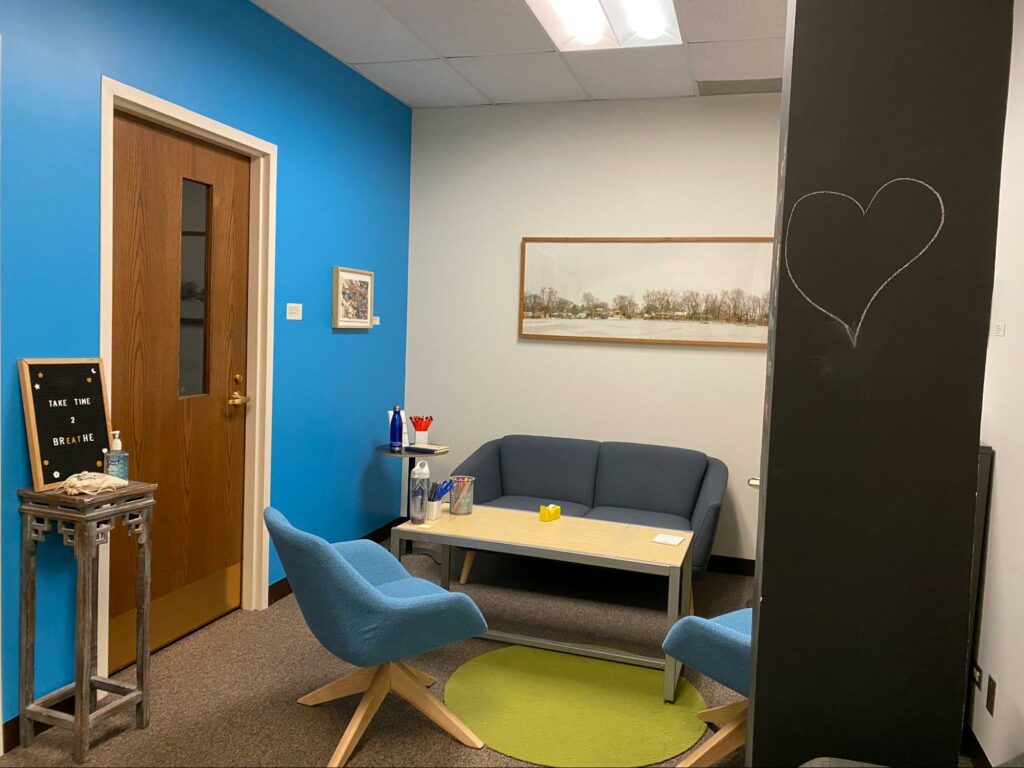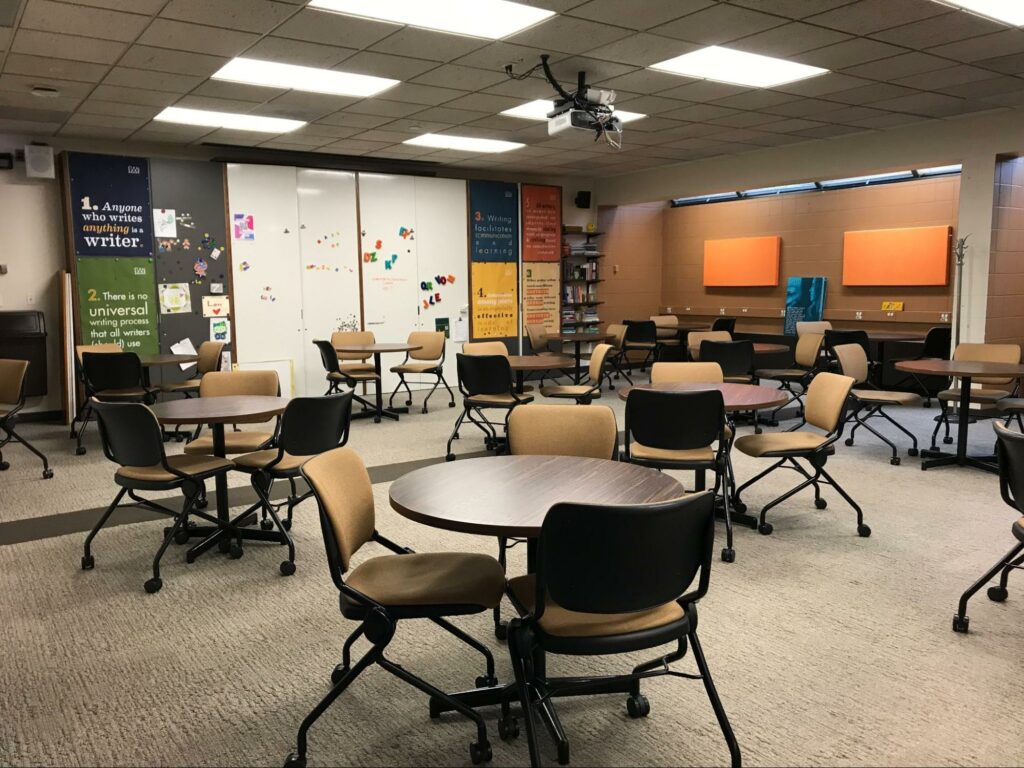This interview was recorded via Zoom on Monday, February 14th, between DePaul University’s writing tutor Ishika B. and Wheaton College’s Writing Consultant Eunice R. DePaul’s Writing Center Blog Editor, Miriam C., prepared and asked the bold questions. Wheaton’s Online Operations Coordinator, Maggie R., supervised the process. We hope you enjoy this conversation between peer writing tutors!
Miriam C: What’s your name, year, and major, and how long have you been working at your current Writing Center?
Eunice R: My name is Eunice R. I’m from South Korea; I’m a sophomore at Wheaton College. My major is Elementary Education, and I have been working at the [Wheaton College] Writing Center since fall semester this year. So, it’s been a little over one semester.
Ishika B: My name’s Ishika B; I’m a sophomore majoring in Psychology with a concentration in Human Development, and I’ve been working at the [DePaul] UCWbL1 since last quarter, so it’s been a few months.
MC: What is your job title? How would you define it and what do you call the people with papers you read?
ER: I would consider my job title a Writing Consultant. I usually call my clients clients. Some people say Writing Tutors, but I personally like the title Writing Consultant better because I see the job more fitting as a consulting conversation type of atmosphere, rather than a “I’m here to tutor you and teach you today” environment.
IB: I just consider myself a Writing Tutor. I don’t really care much about the title. And the people that make appointments with me, I call them students!
MC: Why did you want to become a writing consultant or a peer writing tutor? What attracted you about the position? What’s your origin story?
ER: A lot of my professors have recommended the Writing Center since I was a freshman. But because I was remotely studying in South Korea, I never really had the chance to think about making my own appointments until the director of our Writing Center, Dr. Gibson, reached out to me. She told me she’d received a recommendation from her husband, Professor, Mr. Dr. Gibson. Through the application process, I started to learn more and gain interest. Surprisingly, my sister was a writing consultant in her college for about three years, so listening to her experiences and gaining a perspective on what the job was like made me very interested.
IB: I don’t have a cool story [laughs]. I got an email from the [DePaul] Writing Center saying, “We’re hiring!” and I applied on a complete whim because why not? Now I have the job.
MC: When you started working at the Writing Center, what was one of your greatest challenges, and how did you overcome it? Did you receive any help or advice?
ER: It’s a bit of a funny story. When I was applying, I had my job interview with the Director. I told her, “I need to be honest with you, I’m very scared of writing as an international student who’s never really lived in the U.S. for a long time. I studied on my own; I don’t think I’m competent enough to be a professional writing consultant.” However, she told me, “It’s all about the hospitality and whether you love writing.”
That was a pivotal moment for me. I asked myself, “Do I love writing, even though I feel like I’m not incredibly good at it?” I realized that I did. I think this semester’s challenge has been to tackle transferring that love onto my paper.
IB: As a person, I’m not very patient, and with students you must exercise a certain level of patience. I have a hard time slowing down, letting people express their ideas to me. So, my greatest challenge has been learning how to let them talk instead of talking over them or pushing my ideas. I think I’m getting there with time.
MC: How do you usually start an appointment?
ER: When the student comes in, I always ask them how they’re doing, which is such a light question, but I think it’s important to see where my client is emotionally. Usually they’re like, “Oh, fine, good.” But sometimes, they’ll tell me how they’re really stressed about their paper and haven’t been getting much sleep. Conversations like those give me more context on how I can help them, and help me in return feel closer on a personal level.
IB: I try to ask them about the class they’re in and gauge how they feel about the content they’re covering. Usually, people don’t have much to say, but when they do open up, I understand how they feel about the assignment and move forward with a shared sense of comfort.
MC: How would you describe the vibe of your Writing Center?
ER: I would say hospitable. Because Dr. Gibson encouraged hospitality so much in our training process, and because I knew that was what she expected from us as consultants, I am able to look around at my fellow consultants and only see hospitable people. It’s been a privilege to even be a part of that.
IB: I think it’s really chill at the DePaul UCWbL, especially in the Loop campus office. Lincoln Park gets more people and is more active. But for the most part, the Loop is quiet. Pretty chill. Laid back. I think it’s easy to come visit us. We’re all students; we’re in the same boat.


MC: What’s your favorite genre of writing to give feedback on and why do you like it?
ER: Fact-based writing! When people come with abstract papers like theology, I sometimes feel intimidated. But when clients come with history papers or a very final draft and ask me for the nitty gritty details, I find myself more comfortable. But I’ve been experimenting a lot with my comfort zone. A few days ago, I had a client with Christian poems, and I found myself really enjoying reading them and giving feedback.
IB: I like research papers, especially psychology ones because that’s my field of study. I get to learn from them, which is cool! I also enjoy abstract subjects because I don’t usually get to focus on that a lot.
MC: What is your favorite memory between colleagues, directors, supervisors, or students?
ER: A Korean client—a bit older than me—was struggling with language barriers and didn’t know I spoke Korean too. He was trying to explain his thesis statement to me, but it was hard for him to articulate it in English. After a bit of hesitation, I asked him if he wanted to explain in Korean. He was so shocked! “Is that possible? Can I do that?” We got so much work done because I could explain concepts of English grammar to him in Korean more productively than I would have in English. It was nice to see that little international moment in an American Writing Center.
IB: I have something similar! A couple of weeks ago, I had an older student who had just moved from India. She was struggling to explain her paper and didn’t know what the professor wanted. So I asked her if she wanted to speak in Hindi about this assignment. She said, “I don’t know if we can do that here.” I told her, “I’ll start! Nobody’s watching us.” We ended up extending the appointment to an hour and a half, getting some work done, sure, but mostly talking comfortably.
MC: What’s your favorite place to write for yourself on campus and off campus?
ER: I’ve been experimenting with writing locations recently. I feel writer’s block in the library, sadly, because I feel forced to sit, write, and create a good product. Recently, I’ve really enjoyed sitting at my desk, putting my feet up on the heater, and drinking a cup of tea. I’ve found my brain works very well then.
IB: I can’t focus anywhere that’s not my bed. I’ll try to write at work sometimes, at the library—but there’s so much going on. I’ll try. Nothing ever comes of it. So most times I’m at home in bed, forcing myself to do this thing, in a lucid state, on autopilot.
MC: What TV series are you watching nowadays?
ER: I don’t think I’ve been watching any TV series, sadly. When I have free time, I like to watch movies or K-dramas. I just watched the Amazing Spider-Man for the first time.
IB: For some reason, my TV only has one channel with Hell’s Kitchen always on. When I’m not in the mood to pull out my laptop, I just binge-watch that.
MC: What’s your preferred snack or drink while working?
ER: I’m a big hot chocolate fan. I occasionally have a cup of it when I write, but it makes me very sleepy, so I might put a little candy cane in it for that peppermint taste to wake me up.
IB: I’m weirdly obsessed with staying hydrated, so I drink a lot of water. That usually keeps me awake.
MC: How have you grown as a writer since working at the Writing Center?
ER: I started growing when I realized that every writer is not perfect. That was the biggest barrier for me in writing; I’m very much a perfectionist. I’d start with the first sentence and try to perfect it for hours. But after seeing so many different styles of writing and styles of writers, I realized that there’s a lot of freedom to the craft, that I can use my own voice to write. I learned to enjoy writing so much more now that I know it’s not a perfect process.
IB: Writing for me comes naturally. It’s not something I have to think twice about. But I’ve worked with students that have lots of anxiety over this; it doesn’t come as naturally to them. I think it’s made me more grateful for my process because other people don’t have the exact same strengths, and I want to use what I have to help others. Being a peer writing tutor has made me more empathetic.
MC: Do you have any secret tips for fellow Writing Tutors or writers?
ER: I recommend Grammarly to anybody because it always finds something you don’t see. The amount of people that come to the Writing Center without knowing there’s an accessible, free program to use to review their work is astonishing.
IB: Students become more comfortable when you talk to them about other things than writing, and when you listen about their worries without judgment. They tend to get more comfortable because you’re not a tutor anymore: you’re a friend.
Check out the DePaul Writing Center blog, UCWbLing, to see more content from their tutors! Many thanks to Ishika B. and Miriam C. for their hard work and enthusiasm in this collaboration.
Endnotes
1The UCWbL stands for the University Center for Writing-based Learning, and is pronounced according to the acronym–the UCK-wa-ble.
2DePaul University has two campuses in Chicago, each with its own UCWbL location. Most tutors are required to work at both campuses.